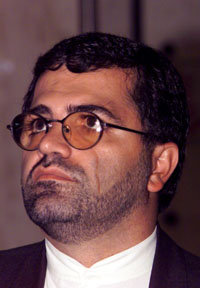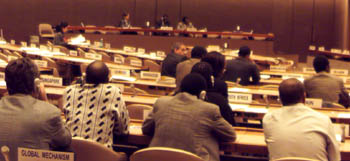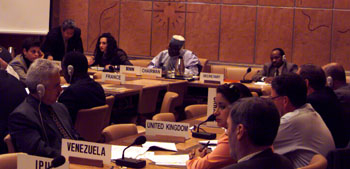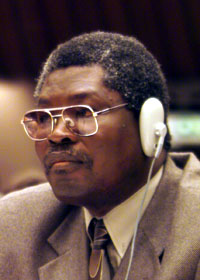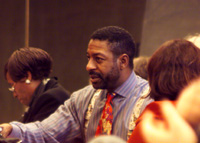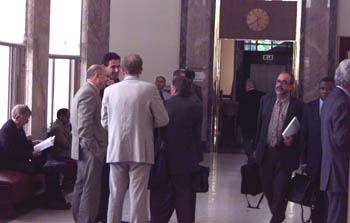|
The
fifth session of the Conference of the Parties (COP) for the Convention to
Combat Desertification Geneva, Switzerland, 1-12 October 2001 |
|||
|
|
||||
Benchmarks and Indicators: Discussion of this issue commenced with statements by delegates. Parties commended CILSS and OSS on their work, and ETHIOPIA, CHILE and ZAMBIA expressed interest in promoting similar initiatives in their own regions Delegates noted the need for national capacity building, financial support, attention from decision makers, harmonization between actors, coordination and decentralization of data, strengthened regional cooperation, civil society indicators and involvement, and information-sharing mechanisms Future work programme of the CST: The Secretariat recalled a COP decision stating that each CST session consider a priority item and delegates discussed possible topics for the next CST session. NAMIBIA highlighted proposals on, inter alia, new and renewable energy and promotion of alternative livelihoods. The EU, with wide support from other participants, suggested the topic of land degradation, which triggered discussion of the concept's definition and relation to desertification. ISRAEL noted links between land degradation and unsustainable pastoralist and agricultural practices and supported focusing on alternative livelihoods Delegates turned to the work programme for a smaller group of experts, to be established under the CST. Delegates noted the subject must emanate from national reports, but felt precise a definition for the work was premature. MOZAMBIQUE questioned whether the Group of Experts should focus on the same topic as had been defined for the CST for the next year, but the Secretariat noted their different mandates and time spans Drafting of the Report to the Conference of the Parties: The CST considered and adopted draft decisions to be transmitted to the COP relating to most agenda items the CST had considered during its session (ICCD/COP(5)/L. 1-7). The decisions cover: survey and evaluation of existing networks, institutions, agencies and bodies; roster of independent experts; review and implementation of scientific and technological aspects of national reports; traditional knowledge; early warning systems; the Dryland Degradation Assessment and the Millennium Ecosystem Assessment; and improving the efficiency and effectiveness of the CST
|
|
|
|
|
Delegates
confer during a break in the CST
|
In
the morning regional groups met to consult on issues under
consideration by the COW contact groups
|
|
|
Interparliamentary
Round Table
|
|
|
The two-day interparliamentary Round Table got off to a good start. Attended by over 30 parliamentarians from around the world. Within the overall COP-5 theme of poverty, sustainable development and desertification, the Round Table's discussion focused on synergies between the CCD and other Conventions, and on Friday will discuss GEF as the CCD financing mechanism. The Round Table is expected to prepare and present its draft declaration to the COP on Friday
|
|
|
|
|
Review
of available information regarding
CCD financing: CCD Executive Secretary Diallo introduced the report. He
highlighted follow-up decisions taken at the November 2000 GEF
Council and CCD COP-4, and reported on the follow-up action to the
May 2001 GEF Council decisions, which agreed that designating land
degradation as a focal area should be pursued as a means for
enhancing GEF support for CCD implementation. He also requested the
preparation of a detailed note elaborating the modalities for
designating land degradation as a GEF focal area for consideration
at the GEF Council's December 2001 meeting and October 2002
Assembly
|
The G-77/CHINA, along with GRULAC, MAURITANIA, CUBA, ST. VINCENT AND THE GRENADINES, HONDURAS, MALAWI, LIBYA, COSTA RICA, MALI, THE BAHAMAS, THE DOMINICAN REPUBLIC, MEXICO, URUGUAY, and others, stressed the need to designate the GEF as the main CCD financial mechanism for implementation. NEPAL, ZIMBABWE, MOROCCO and others expressed hope that future GEF funding would be instrumental in implementing NAPs. ARGENTINA, TUNISIA, and others said GEF funding should be on the same footing as other environmental conventions, such as Climate Change and Biodiversity
Progress made by affected country parties in CCD implementation: The Secretariat presented its report, containing a non-exhaustive account of its support upon request from country parties, to national, subregional and regional processes including, initiating partnership agreements, assisting selected subregional initiatives that enhance transboundary cooperation and the convening of a consultative process to conclude partnership agreements. He drew attention to the complementary information report. MOROCCO and TUNISIA suggested updating the report to cover all activities before the COP
|
The
contact group on the CRIC met briefly and agreed that regional
groups should submit their views in writing to enable the
preparation of a draft document that would serve as a basis for
discussion on Friday. The draft document is expected to contain an
introduction and the regional positions. The three broad preferences
on the CRIC are: as with other conventions, a fully-fledged
intersessional body to review implementation and address all aspects
of the process; a body that is limited both in its scope of review
and time, and possibly a reformed CST to carry out this review
function; and an intersessional body whose permanence or ad hoc
nature is still undetermined
|
|
|
|
| ||||||||||||||||||||||||||||||||||||||||||||||||||||||||||||
|
|
|
| © 2001, Earth Negotiations Bulletin. All rights reserved. |
|


